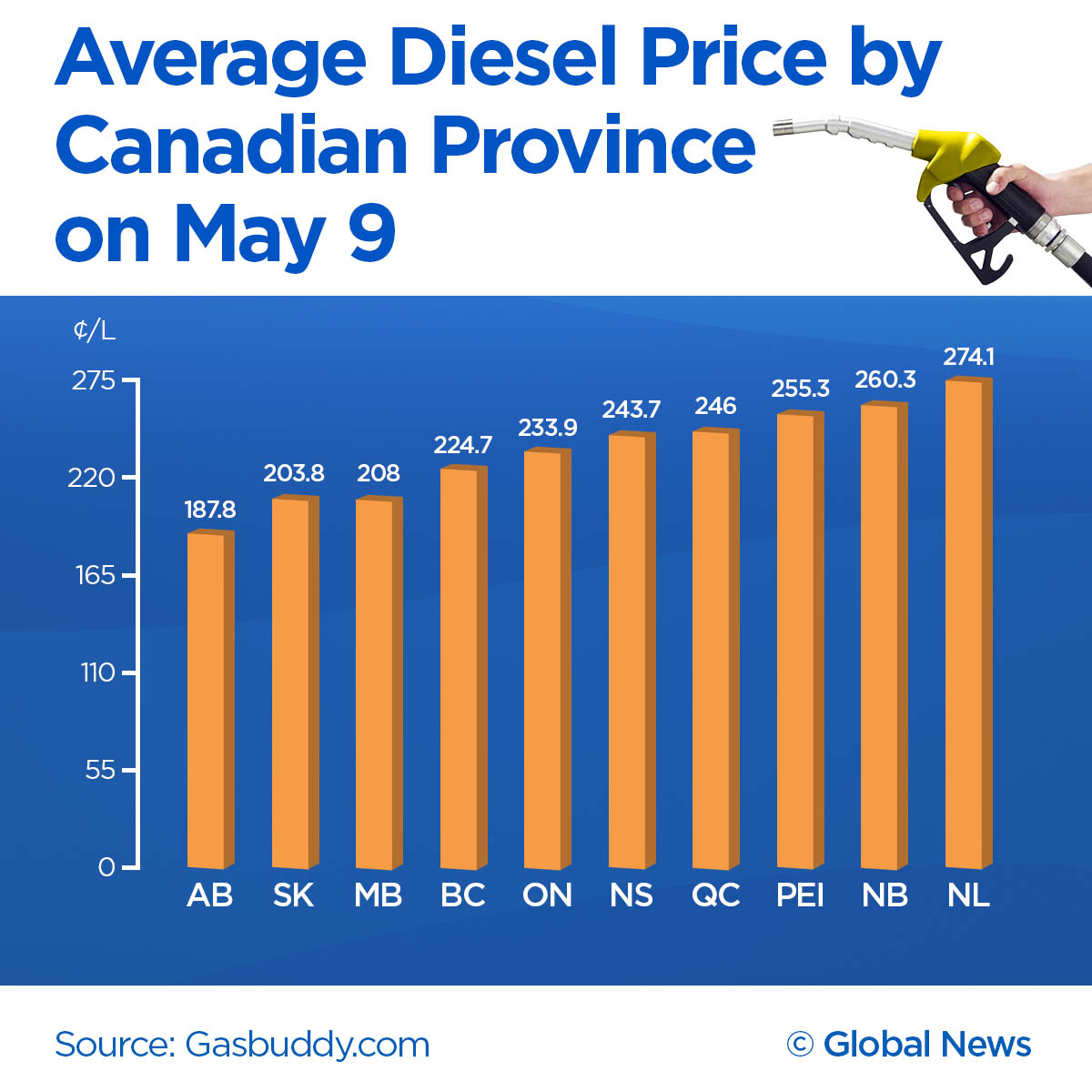Canadians are paying much attention to the record cost of regular gasoline, but the price for another fuel should also be raising eyebrows, experts say.

Diesel prices are soaring higher than gas, averaging $2.22 a litre on Monday, according to GasBuddy.com. In comparison, regular gas averaged around $1.89 per litre in the country.
Diesel drivers have no doubt been impacted, but that doesn’t mean every other Canadian should disregard its record price at the pumps, said Patrick De Haan, head of petroleum analysis at GasBuddy.com.
“Diesel is really the fuel that powers the economy: semi-trucks, trains, ships in some instances, are all using diesel,” he told Global News.
“This is going to be something that will affect you at the grocery store, at the hardware store, clothing store, electronic store, etc. This is something that will very much become an economic pinch point with the higher cost of fuel to get all of these various goods to the market.”
At this time last year, diesel prices averaged under $1.45 per litre throughout Canada, Statistics Canada data shows. In March 2022, diesel price averages were either near or above $2 a litre in parts of the country. Average prices for April and May were not yet available.
On Monday, the only province that had diesel under $2 a litre in Canada was Alberta, with prices averaging around $1.87 per litre, according to GasBuddy.com.
In Ontario, diesel averaged $2.33 a litre, while Quebec saw prices round out at $2.46 per litre. The highest price for diesel fuel in Canada was in Newfoundland: $2.74 a litre.
“They’re absolutely astronomical,” said Roger McKnight, chief petroleum analyst at En-Pro International Inc., on current diesel prices.
“They’re higher than premium gasoline, which is completely unheard of.”

Why is diesel so expensive?
Diesel demand has increased as the economy reopens from COVID-19 shutdowns, De Haan said, and oil producers haven’t been able to keep up.
It’s a similar story with gas prices, which have shot up due not only to demand, but also to the impact of the invasion of Ukraine by Russia, a major oil producer that many western nations have punished economically for launching the war on Feb. 24.

Get breaking National news
But also, several refineries have closed down over the years, resulting in less diesel supply on the market, added De Haan. He cited as an example a Come By Chance refinery in Newfoundland that scaled down operations in 2020. It was bought by a Texas-based equity firm in November with plans to produce renewable diesel and sustainable aviation fuel beginning this year.
“Not only that, but diesel is also competing in a way with jet fuel. Jet fuel, diesel and heating oil are essentially all products that come from the middle of a barrel of oil,” he said.
“They’re similar in ways and they’re different, but they all compete with each other. So, as more planes are taking to the sky, there may be more jet fuel demand and the refinery may produce more jet fuel at the cost of diesel.”

Every Canadian will be impacted by the high cost of diesel, not just those who own diesel vehicles, said Dimitry Anastakis, a professor at the Rotman School of Management.
Last year, 65,881 new diesel vehicles were registered in Canada, compared with 79,330 hybrid-electric cars and 1,415,361 gasoline vehicles, Statistics Canada data shows.
However, those groceries you just bought at the store that went up in price? They were likely brought there on a diesel-powered truck, Anastakis said.
“Prices are going up not just in terms of the end-use product, but in terms of the transportation system that’s there,” he said.
“In order to keep up with inflation, it’s kind of a vicious cycle, retailers are raising prices and therefore suppliers are raising prices and transportation companies are raising prices, too.”
Diesel fuel is one of the largest costs for transportation operators, said Jean-Marc Picard, executive director of the Atlantic Provinces Trucking Association.
“If this lasts for another few months, we’re certainly going to see the cost of certain goods go up,” he told Global News last month.
“It’s the highest cost in freight, and everything moves by freight.”
Will diesel prices go back down?
Diesel historically cost Canadians less than regular gas at the pumps, but the move to higher prices as inflation rises shows we’re entering a “really volatile period,” Anastakis said.
“Things are going to be up and down and they’re going to be up in terms of costs, and down in terms of what you get for those costs,” he said.
“So this is, unfortunately, a new shared reality of a lot of volatility around these kinds of issues.”

When it comes to solutions, there’s not much governments can do as oil is a global commodity in worldwide demand, Anastakis added.
“The prices are set elsewhere and they’re global. There are local variations, they are regional variations. But by and large, oil and gas is the one global commodity where there isn’t much leeway in terms of what goes on,” he said.
“Outside of cutting some taxes and offering consumers rebates, … there is not a lot of leeway.”
But, cutting taxes could backfire and result in increased demand, McKnight said. Aside from companies increasing oil production, “demand destruction” could be a way to drop prices, he added.
“If you don’t need as much gasoline or don’t need as much diesel because you’re not consuming as much, prices will come down,” McKnight said.
— with files from Global News’ Travis Fortnum and The Canadian Press









Comments